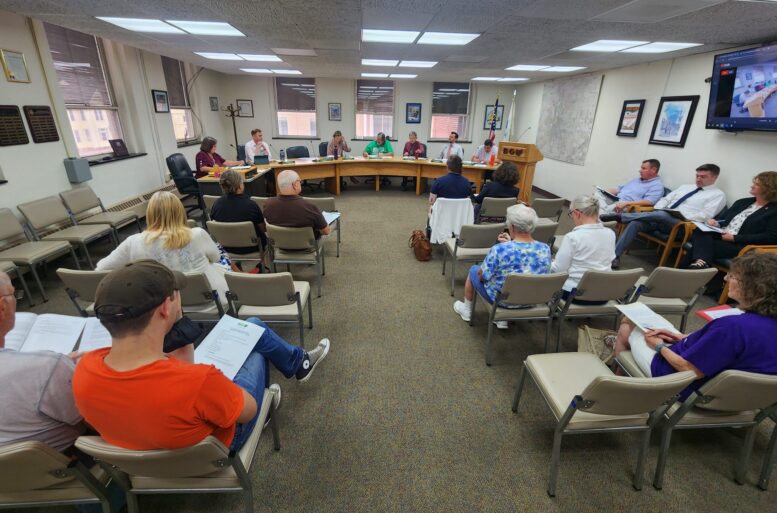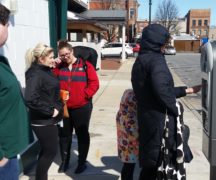By JAN LARSON McLAUGHLIN
BG Independent News
Bowling Green City Council members introduced two conflicting resolutions on State Issue 1 on Thursday evening – but neither are likely to be approved in time for the special election on Aug. 8.
Issue 1 would change Ohio’s constitution and require 60% of voters to pass a constitutional amendment.
Council member Jeff Dennis introduced his resolution that would urge Bowling Green residents to vote against Issue 1. He had sent out his resolution to fellow council members to review prior to their meeting.
Council member Greg Robinette responded with his own resolution Thursday evening, urging Bowling Green citizens to decide for themselves how to vote on Issue 1.
Resolutions require three readings for passage. There are no City Council meetings in July due to the city offices making the move from the current building to the new building at 305 N. Main St.
So to be in place in time for the election, Dennis asked council to conduct the first and second readings of his resolution on Thursday, so the final reading could be heard in early August.
Voting yes for two readings were Dennis, Mark Hollenbaugh, Rachel Phipps and Nick Rubando. Voting against were Robinette and Bill Herald. Council member Joel O’Dorisio was absent. The Ohio Revised Code requires support by at least six of seven council members to suspend the rules for legislation – making it highly unlikely that either resolution will be passed prior to the Aug. 8 election.
Dennis explained his reasoning for opposing Issue 1.
“Issue 1 is not and should not be a partisan issue,” Dennis said. “The principle of government by the majority is foundational to our democracy. Issue 1 would severely undermine that principle and strip Ohioans of a right they’ve had for more than 110 years.”
The Ohio General Assembly previously eliminated August special elections during a lame duck session in December of 2022. This August special election will cost Ohio taxpayers millions of dollars and is being held during a time when few Ohioans are likely to vote, Dennis added.
“Issue 1 would not only undermine one of the core values our country was founded on, but the state legislature also saw fit to resurrect the costly August election – which they all but eliminated less than a year ago – in order to consider this issue,” Dennis said. “It’s estimated that this election will cost Ohio taxpayers tens of millions of dollars. That funding would have been far better spent investing in communities like Bowling Green which have already lost out on millions in Local Government Funds in recent years.”
Dennis’ resolution urges Bowling Green residents to vote against Issue 1.
Bowling Green City Council is committed to protecting the rights of its citizens to participate in the democratic process, the resolution states. Issue 1 would raise the threshold for passage of a constitutional amendment to 60%, giving 40% of the voters the ability to block the will of the majority.
“Issue 1 would undermine the sacred principle of one person one vote,” the resolution states.
Robinette’s resolution urges citizens to decide for themselves how to vote on Issue 1. It states that Issue 1 could allow Ohio to join 34 other states where the threshold for amending a state constitution is greater than a simple majority.
“Issue 1 preserves citizens’ rights to propose constitutional amendments,” the resolution reads. “Groups and individuals will still be able to get issues on the ballot and initiate changes in the Ohio Revised Code.”
Robinette’s resolution states that “raising the threshold to amend the Ohio Constitution will protect the people of Ohio from out-of-state special interests who have invested millions of dollars to manipulate the Ohio Constitution.”
“It is arguably against state and federal law for the Council of Bowling Green, Ohio, to tell its citizens how to vote on Issue 1,” the resolution continues.
“Council of the City of Bowling Green supports the rights of its citizens to decide for themselves how to vote on Issue 1,” Robinette read from the resolution. Bowling Green City Council “does not advocate for partisan positions or talking points on state or national issues that are not directly related to its local governance functions.”
Three citizens also spoke about the matter during the meeting – all opposed to Issue 1.
Lindsay Jo Durham urged people to vote “no” in August.
“Ballot issues give citizens the freedom to make laws when legislators neglect to do so,” Durham said. “The passing of Issue 1 would restrict our freedom and take away our rights.”
“It permanently shreds our Constitution, ends majority rule in Ohio, and takes away our right to decide what happens here, by undermining the sacred principle of ‘one person, one vote.’”
Issue 1 would require 60% of the vote to pass a constitutional amendment. It would also require 5% of signatures from all 88 counties for an issue to be placed on the ballot, compared to the current 44 county requirement. And it would eliminate the 10-day cure period for signatures on petitions.
“This special election, lobbied for by special interests and funded by taxpayers, is an attack on our constitutional rights and an attack on our democracy,” Durham said.
Joyce Kepke echoed those thoughts, saying Issue 1 would allow the minority to overrule the majority in Ohio.
Debbie Dalke agreed, saying Issue 1 would allow 41% of voters to stop a law that 59% of the voters support.
Constitutional amendments in Ohio are rare, Dalke said, listing changes made by voters over the years to allow women in the National Guard, issuance of bonds for low income housing, establishment of a minimum wage, and the restriction of smoking in public places.
None of those would have passed if Issue 1 were in place, she said.
“I strongly urge you to adopt this position,” Dalke said of Dennis’ resolution.





